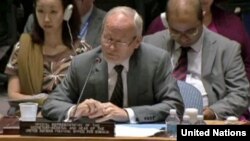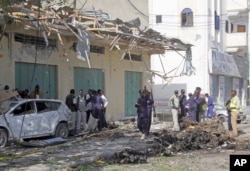The outgoing United Nations envoy to Somalia, Nicholas Kay, says the country has an “unstoppable momentum” toward being a stable and secure country.
In his final interview before leaving office, Kay told VOA that Somalia has managed to convert a dream of being a federal Somalia into reality. The country now has five interim regional administrations and federal member states, which he says brings government and accountability closer to the people.
“I arrived full of hope, and I’m leaving not just with hope but with a very firm conviction that Somalia is now a fragile but recovering country and no longer a failed state,” he said.
'Reasonable progress'
Kay says the country has also made "reasonable progress” in fighting al-Shabab militants, recovering up to 14 towns and districts during his two and a half years in office. The government and the African Union force AMISOM took control of the capital, Mogadishu, in 2011.
Kay said the militant group is territorially in a “much weaker position” and is suffering from infighting between factions that support the so-called Islamic State and those still loyal to al-Qaida.
However, he said it would be a concern if IS were to gain a foothold in Somalia.
“Clearly, it would be a concern if they were to consolidate an ISIL/Daesh presence in Somalia and it resulted in extra resources or manpower for the organization. That would be a concern,” he said.
Existential threat
Kay said al-Shabab still poses a terrorist threat and does “terrible things” in terms of suicide bombings and targeted assassinations. But he insists it’s an organization that no longer poses an “existential or strategic threat” to Somalia.
He warns there needs to be a concerted effort in developing Somali national security forces – police and army. The government and its allies have been trying to do so for years with very little success.
Kay says the number of African Union troops in the country will go down when Somali troops become capable.
“The time scale for that is clearly impossible to fix rigidly but it will be reviewed again at the end of 2016; I think there is an expectation that AMISOM numbers will start to fall after then,” he said.
Kay praised the U.N. role in Somalia and for expanding the operations of the international body outside Mogadishu but he also lamented the loss of eight U.N. staffers who died in Somalia while he was in office.
“My greatest disappointment is the death of U.N. colleagues at the hands of terrorists in Somalia. I pay tribute to those eight colleagues who have been killed in the period which I have been in office.”
He also said was delighted to have worked in a country where he says every single Somali that he met is “deeply political."
Kay praised the resilience of Somalis who in the face of deadly Al-Shabab attacks managed to bounce back quickly.
“Watching hotels get bombed in Mogadishu and then seeing the very next day the work starting on rebuilding them, and then the next week or month reopening for business is very, very inspirational.”
Fellow British diplomat Michael Keating replaces Kay and will start work in January.







